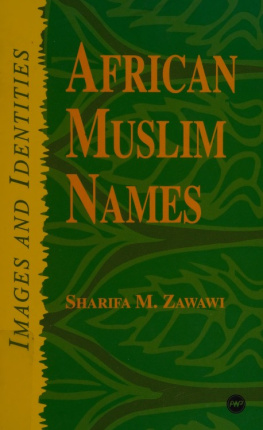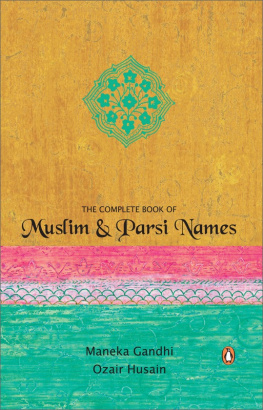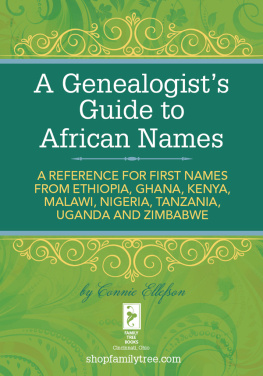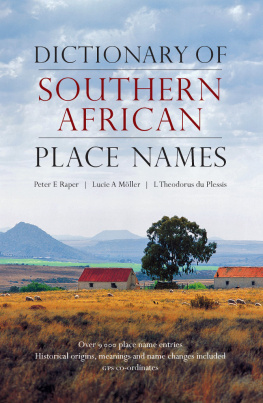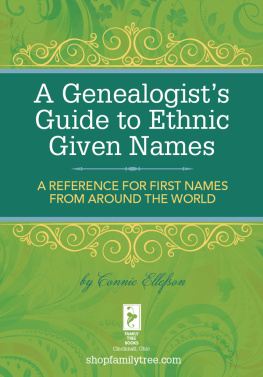
African Muslim names : images and identities
Pages
African Muslim names : images and identities
Zawawi, Sharifa This book was produced in EPUB format by the Internet Archive. The book pages were scanned and converted to EPUB format automatically. This process relies on optical character recognition, and is somewhat susceptible to errors. The book may not offer the correct reading sequence, and there may be weird characters, non-words, and incorrect guesses at structure. Some page numbers and headers or footers may remain from the scanned page. The process which identifies images might have found stray marks on the page which are not actually images from the book.
The hidden page numbering which may be available to your ereader corresponds to the numbered pages in the print edition, but is not an exact match; page numbers will increment at the same rate as the corresponding print edition, but we may have started numbering before the print book's visible page numbers. The Internet Archive is working to improve the scanning process and resulting books, but in the meantime, we hope that this book will be useful to you. The Internet Archive was founded in 1996 to build an Internet library and to promote universal access to all knowledge. The Archive's purposes include offering permanent access for researchers, historians, scholars, people with disabilities, and the general public to historical collections that exist in digital format. The Internet Archive includes texts, audio, moving images, and software as well as archived web pages, and provides specialized services for information access for the blind and other persons with disabilities. Created with abbyy2epub (v.1.7.6) Images and Identities Cotoiado CMtsw" '11 Library
L^rST
2 375 A33 Z3S mg
African Muslim Names: Images and Identities
African Muslim Names:
Images and Identities
Sharifa M.
Zawawi Africa World Press, Inc. P.O. Box 1892
P.O. Box 48 Africa World Press, Inc. P.O. Box 1892 Trenton, NJ 08607
P.O.
Box 48 Asmara, ERITREA Copyright 1998 Sharifa M. Zawawi First Printing 1998 All rights reserved. No part of this publication may be reproduced, stored in a retrieval system or transmitted in any form or by any means electronic, mechanical, photocopying, recording or otherwise without the prior written permission of the publisher. Cover and Book: Jonathan Gullery This book is set in Palatino Library of Congress Cataloging-in-Publication Data Zawawi, Sharifa African Muslim names: images and identities / by Sharifa M. Zawawi. cm. cm.
ISBN 0-86543-572-3. - ISBN 0-86543-573-1 (pbk.) 1. Names, PersonalAfrican. 2. Names, personalMuslim. Title. Title.
CS2375.A33Z39 1998 929.4'096dc21 98-22129 CIP Allaahu laa ilaaha illaa huwa. lahuu-l-asmaau-l-Husnaa. God, there is no deity except Him. His are the most beautiful names.1
CONTENTS
Introduction ix PART ONE Chapter One WHAT'S IN A MUSLIM NAME 1 Africa and Islam 4 Swahili Society Beyond the Coast of East Africa 6 Hausa-Fulani Society Beyond Nigeria 8 Chapter Two NAMES AND NAMING 11 How Names Are Chosen 11 Rituals Connected with Naming 13 Names and Reputations 17 Forms of Address 19 Chapter Three MUSLIM NAMES 21 Source and Significance 21 Bad or Abusive Names 23 In the Name of God 23 God's NameAllah 25 The Beautiful Names 29 Names Signifying the Worship of God 35 The Names of Prophets 37 The Names of Prophet Mu-Hammad 38 Names of Prophet MuHammad's Family 39 Names Derived from Verses in the Qur'aan 43 Names from the Islamic Calendar 45 Chapter Four ARABIC MUSLIM NAMES 51 From Nature 51 From Plants and Perfumery 53 From Animals 54 From Land, Gem Stones and Precious Metals 57 From Water 58 From Colors 58 From Occupations and Titles 59 Chapter Five ROOTS AND DERIVATIONS 63 Basic Root and Vowel Patterns 63 Nouns and Verbs 65 Gender: Masculine and Feminine 66 Comparative Form 76 Names and Their Spelling 80 Chapter Six NAME CHANGES 85 Adoption 85 Marriage 85 Immigration 86 How Are Muslim Women Solving This Problem 88 Identifications 89 Converts Taking on Names 91 Personal Names and Politics 97 Names and Personal Advancement 100 Historical Changes 101 New Names 104 Chapter Seven AFRICAN NAMES AND MEANINGS African Muslim Names 110 Islamic Names Used by the Hausa-Fulani and Swahili 111 Spelling and Pronunciation of Hausa-Fulani and Swahili Muslim Names 117 Arabic Grammatical Elements Affecting African Names Case Endings 120 A Comparison of Hausa-Fulani and Swahili Muslim Names 124 PART TWO Hausa-Fulani Male Names 131 Hausa-Fulani Female Names 134 Swahili Muslim Male Names 136 Swahili Muslim Female Names 165 References 185
INTRODUCTION
The Children Those many children running in your space Have you named them or shall the gardens do it? Those green children climb from the pit or do they descend from the mountain top? These very tiny children I see now like fish of many colors in the fishbowl of space. You are their water.2 The matter of names raises perennial questions. This book begins with the title of my previous one.
What's in a Name: Unaitwaje?, but this time the subject matter is more specific: What's in an African Muslim name? The present book answers this new question. African Muslim Names: Images and Identities, provides an overview of African Muslim names, illustrates their adaptation to African languages, and reveals the synthesis that comes about between the indigenous and the Islamic. Above all, this book discusses the meanings of African Muslim names and relates them to the contexts in which they appear. A 'name' is simply a word, phrase or sentence by which a human being is known. By it, s/he is identified, called, described, distinguished and classified. Nothing on this earthand in much of the heavensexists without a name.
There are names for people, things, buildings and places, and also for storms and hurricanes. Man-made and natural phenomena alike are known through their names. What's in a name? A name conveys history, culture, heritage, language and a consciousness of self-image and pride. An Islamic name may in certain contexts also signify an ideological, social and political stand. In short, our names convey our existences and our images of ourselves.3 Onomastics or the study of names invites many disciplines: history, geography, linguistics, literature, philosophy, anthropology, psychology, sociology, theology, even legal studies. It engages concern with character, personality, adoption, education, marriage, conversion, migration and death.
In all,identity is the underlying feature and the principal one. Personal names provide an important component of African cultural identities.4 They reach across ethnic, geographical and national boundaries and extend identity from the African continent to the Pan-African diaspora. Names, like language itself, provide their bearers with a sense of oneness in spite of ethnic differences. They bestow social and economic openness and invite participation. The first thing an African wants to know when he or she meets you is your name. A name is all too often taken for granted.
Next page
